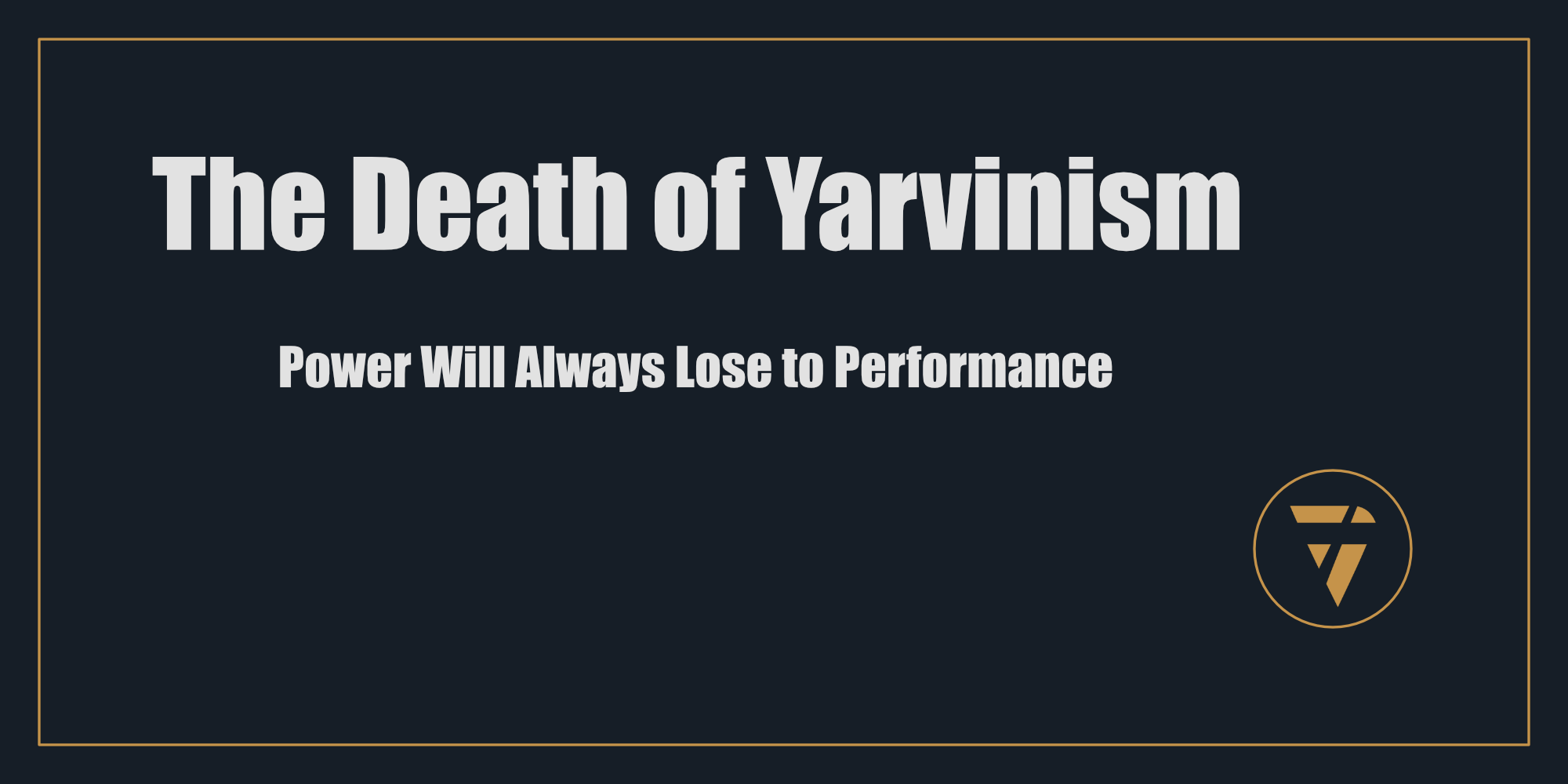The Death of Yarvinism

Power Will Always Lose to Performance
Ladies and gentlemen, let me tell you about a dangerous idea. An idea that has taken root in the minds of billionaires, technocrats, and self-proclaimed philosopher-kings. An idea whispered in the corridors of power, repeated in private conversations over whiskey and cigars, and now parroted by those who believe they have seen the future, and decided they should rule it.
This idea is Curtis Yarvin’s.
It's the belief that democracy is dead. That it's too slow, too corrupt, too messy to survive. That the world belongs not to the governed, but to the governors. That power should be concentrated, not distributed. That governance is not a social contract, but a software problem—and that like all inefficient systems, it needs a hard reset.
A king. A CEO-monarch. A sovereign, ruling without constraint, without challenge, without you.
It is an idea that seduces the powerful because it flatters them. It tells them that their success, their wealth, their intelligence are proof of their right to command. That if only the dead weight of elections, institutions, and public will were removed, progress could finally happen.
And like all the worst ideas in history, it sounds reasonable if you don’t think too hard.
But here’s the problem:
It doesn’t work. It never has. It never will.
And the people who believe it—who want to rule by it—are not builders of empires.
They are fools walking into their own destruction. And dragging us to ours.
The Fundamental Flaw of Yarvin’s World
There is a reason dictators cheat. There is a reason absolute rulers do not compete on a level playing field. There is a reason monopolies do everything in their power to crush competition instead of outperforming it.
Because they lose. Every time.
Yarvin sells the idea that a society run like a startup—a king instead of a president, a sovereign instead of a system, obedience instead of consensus—would function better than the chaos of democracy.
What he does not understand, what he cannot understand, is that power is not performance.
- A title does not make you competent.
- A crown does not make you effective.
- A monopoly does not make you the best.
He assumes consolidation creates efficiency. But efficiency is not the absence of challenge. Efficiency is the result of adaptation, competition, and correction.
It is the result of being tested, proven, and forced to evolve.
Yarvin’s world does not allow for that. His world is top-down, rigid, static. It assumes that once power is granted, it belongs to the ruler.
But power is not something you own.
Power is something you rent. And the rent is due every day.
Why Dictatorships Always Cheat
Look to history. Show me an absolute ruler who did not fear his own people. Show me an empire that did not crumble under its own weight. Show me a king who did not build walls to keep his subjects in, while telling them they were free.
If power could maintain itself through competence alone, there would be no need for:
- Secret police.
- Censorship.
- Rigged elections.
- Arrests of opposition leaders.
- Disinformation campaigns.
- A monopoly on force.
But every authoritarian, from ancient emperors to modern strongmen, has resorted to these tactics.
Why?
Because they know their system doesn't actually work.
A true meritocracy—the thing Yarvin claims to want—would strip them of power immediately. Because the best rise, the weak fall, and no one stays on top forever.
Unless they cheat.
And cheating is the confession of failure.
Silicon Valley’s Fatal Miscalculation
The tech elite love Yarvin’s ideas because they assume that in his world, they would be the kings. They see themselves as sovereigns-in-waiting, hindered only by the slow, stupid masses who do not recognize their genius.
But if his world actually existed—if power was truly distributed by competence—most of them would be thrown out on day one.
Because success in Silicon Valley is not a measure of leadership. It is a measure of:
- Who had access to capital first.
- Who controlled the platform, not who built the best product.
- Who monopolized, not who innovated.
- Who lobbied regulators to protect their dominance.
They win not because they are the best.
They win because they play in a rigged game.
And the moment a real, open, competitive system exists, they lose.
They don’t want a world where the best ideas win.
They want a world where they have already won.
The Only System That Survives
Yarvin’s dream is the same as every self-proclaimed elite who came before him:
A world where power is hoarded, not earned.
Where success is granted, not tested.
Where rulers rule by right, not by results.
But history is clear. The systems that last are not the ones that concentrate power. They are the ones that force power to prove itself.
- Monarchies fell to more flexible, economically-driven governments.
- Corporate monopolies crumbled under market competition.
- Centralized regimes were overthrown by decentralized networks of resistance.
Every system that refuses to evolve, dies.
Yarvin’s system is designed not to evolve.
That is why it will fail.
They Are Breaking Our World Because They Can't Build Their Own
We do not live in a world where these ideas are hypothetical. They are being tested right now.
Every attempt to replace democracy with dictatorship, every push to consolidate control in the hands of fewer and fewer people, every movement that seeks obedience instead of accountability—these are the real-world applications of Yarvinism.
And every single one of them is already collapsing under its own weight.
They will leave destruction in their wake. Because they are not builders.
They are looters.
They are men who have inherited a system that allowed them to succeed—who now seek to burn that system down, assuming they can rule the ashes.
But they can’t.
Because the world is not theirs to control.
It belongs to those who prove themselves every day.
To those who create, who adapt, who refine, who outcompete, who deliver, who build.
Not to those who declare themselves king.
The Final Word
If Yarvin’s world comes to pass, it will be short-lived. Because it's not built to last.
It's a system of control in a world where control is always temporary.
The future does not belong to kings.
It belongs to whoever proves they deserve it.
And in that world, Yarvin and his would-be sovereigns do not survive.
They lose.
Because in the end, only what works survives.
This is what I’m working on. Tell me what you think, I enjoy the conversation! Subscribe and follow the work in real time.
Thanks!
B

Power is not performance. The second you make rulers prove their worth, they lose. That's why every autocrat cheats—because in a fair fight, they can't win.
PS -






